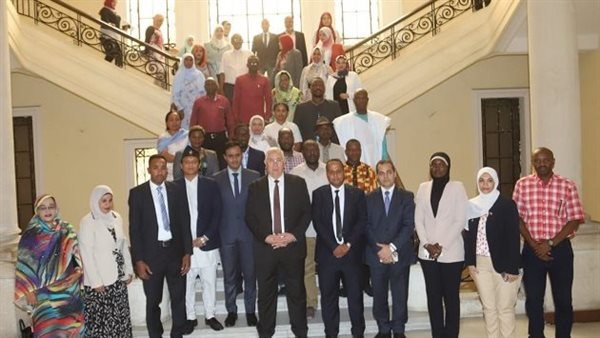The Egyptian International Center for Agriculture of Foreign Agricultural Relations completed training programmes in the areas of poultry production and health, as well as the development of fish farms, and Al-Qusayr, the Minister of Agriculture and Land Reclamation, handed over representatives from Africa and Asia, the 23 trainees representing 12 countries.
At the closing ceremony, which took place at the Ministry of Agriculture, Al-Qusair emphasised that Egypt is attempting with all of its resources to offer all means of cooperation, particularly in the agricultural sector, especially the areas of training to transfer technical expertise to the brothers from the countries of the continent, and from Thereafter, he transferred those experiences to their country. This is in accordance with His Excellency President Abdel Fattah Al-directives. Sisi’s
The Minister of Agriculture stressed the significance of giving the trainees an overview of the level of fisheries development Egypt has seen, both theoretically and through field trips to farms. He expressed his hope that the trainees would take these experiences back to their home nations to help the continent develop and ensure food security.
According to Al-Qusair, the Egyptian government has completed a number of initiatives involving fish breeding, making Egypt the first country in the Middle East and sixth in the world overall. And third in the world for tilapia fish output.
He noted that Egypt’s investments in the poultry industry total more than 100 billion pounds, and it employs more than 3.
5 million workers, highlighting the fact that Egypt is highly self-sufficient in this field, which is a source of national revenue, and that the majority of its workforce comes from the private sector.
He expressed his hope that the trainees had benefited from these experiences and transferred them to their countries, particularly in light of the current challenges facing food security in the region, especially in light of the recent crises starting with Corona. He said that the Egyptian state is interested in these two sectors and provides them with all support and facilities. Climate change and the Russian-Ukrainian War both had an impact on food security.
In order to address these issues, he continued, all nations with untapped natural resources must be maximally exploited, all methods of international collaboration must be activated, integration must be achieved, and added value must be maximised in order to achieve food security.
The Egyptian International Center for Agriculture and all employees in the international agricultural relations department were congratulated by the minister of agriculture for their work in setting up training programmes, welcoming envoys, and securing all available resources to help them.
In contrast, Dr.
23 trainees representing 12 countries from the continents of Africa and Asia, including Pakistan, Senegal, Nepal, Benin, Sudan, Niger, Burkina Faso, Liberia, Burundi, Madagascar, Togo, and Mauritania, participated in the two programmes for poultry production and health and the development of fish farms, according to Saad Moussa, the supervisor of foreign agricultural relations. Both programmes lasted 60 days and included theoretical and practical components.
He continued by saying that significant visits to the research labs of various institutes, as well as various farms and production projects, were organised for the envoys in order to inform them of the various noteworthy Egyptian experiences in these two fields and transfer them to their respective nations.
For their part, the envoys congratulated the Egyptian government, particularly the Ministry of Agriculture, for the cordial welcome, the extraordinary assistance, and the recent growth and revival of the agricultural industry in Egypt. They also appreciated the training programmes for meeting their training needs and identifying Egyptian experiences in the growth of poultry and fish farms as well as in the fields of production and health. .
23 African and Asian delegations get diplomas from agriculture attesting to the completion of training programmes in the poultry and fisheries industries.

